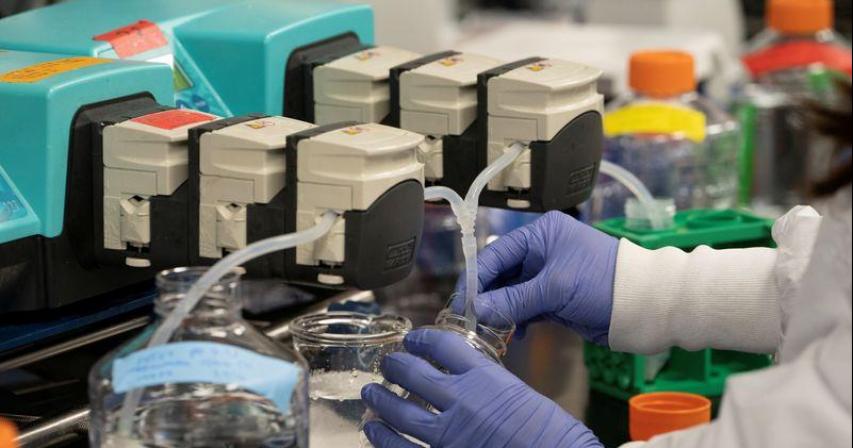Money, talent flowing into mRNA sector after COVID-19 success
- 3 years ago

The success of COVID-19 vaccines based on messenger RNA (mRNA) is smoothing the way for using the novel technology not only in other vaccines, but possibly as treatments for cystic fibrosis, cancer and other hard-to-treat diseases.
Scientists say mRNA has the potential to target diseases that cannot be reached by conventional drugs.
U.S. emergency authorization of the vaccines - one from Moderna Inc and another from partners Pfizer Inc and BioNTech SE – and their gene-based manufacturing processes has shown that the Food and Drug Administration is open to broader use of the previously unproven technology, according to interviews with eight top experts in the field of mRNA.
Billions of dollars in capital have flowed into mRNA-focused companies based on these raised expectations – hundreds of millions in the last few months alone. And with FDA acceptance, the field is attracting top scientific talent, experts said.
“There is more attention and focus on mRNA now that it has proven to be a technology that works,” said Glenn Hunzinger, U.S. pharmaceutical and life sciences leader at consulting firm PricewaterhouseCoopers.
Regulatory authorization of the vaccines “accelerates the process” for other mRNA therapies, providing real-world evidence that it is possible to secure fragile mRNA components during manufacturing and distribution, said Josh Kellar, co-lead of Boston Consulting Group’s COVID-19 team.
The technology is often likened to the operating system on a computer, allowing drugmakers to alter their target by inserting new genetic code into a manufactured form of mRNA, a natural chemical messenger that instructs the body to produce specific proteins.
Its advantage in vaccines is versatility and speed compared to standard technology requiring long lead times to produce and purify proteins and create a vaccine.
In 2020, given the urgent need created by the coronavirus pandemic, more than $5.2 billion was invested in companies engaged in developing mRNA vaccines and therapeutics - up from $596 million in 2019, according to India-based research firm Roots Analysis.
In just the last three months, mRNA company CureVac NV raised $518 million, Arcturus Therapeutics Holding raised $150 million and Gilead Sciences Inc agreed to a therapeutic HIV vaccine deal worth up to $785 million to mRNA company Gritstone Oncology.
Over 150 mRNA vaccines and therapeutics are in development globally, Roots Analysis said. Most are still in early animal testing, but more than 30 have reached human testing.
mRNA can be very difficult to work with, making future successes with treatments uncertain.
Instructions from mRNA are fleeting and non-specific about where in the body it goes, which works well when directing cells to make a harmless fragment of the coronavirus to trigger an immune response. It is more difficult to send those orders to a specific tissue, like the lungs or heart muscle, which requires different delivery methods or encapsulation to protect the fragile mRNA molecule.
Most of last year’s funding went to COVID-19 projects but enabled companies to also push forward with other disease categories.
Moderna, for instance, is working on treatments for heart disease, cancer, and rare diseases. Its most advanced non-COVID program is a vaccine for cytomegalovirus, the leading cause of birth defects in the United States.
Translate Bio Inc may be the first to market with an mRNA treatment if its inhaled drug for cystic fibrosis is shown to succeed at delivering instructions to make a protein known as CFTR to the lungs, according to Chief Executive Ron Renaud.
The company expects to have interim results from a mid-stage trial in the second quarter of this year. If safety and efficacy results are encouraging, it would conduct a larger trial and then potentially apply for U.S. approval.
People with cystic fibrosis, a life-shortening lung disease, have mutations in the CFTR gene that cause the protein to malfunction or not be made at all, leading to a buildup of thick mucus, which causes lung infections and other serious health complications.
“Most drugs treat the downstream effects of disease ... mRNA is in the business of replacing what’s missing,” said Joe Payne, CEO of Arcturus, which is working to develop mRNA vaccines for COVID-19 and influenza, as well as medicines for liver disease and cystic fibrosis.
Dr. Drew Weissman, professor of infectious diseases at the University of Pennsylvania’s Perelman School of Medicine, is one of the two scientists credited with a groundbreaking 2005 discovery of how to alter the molecular structure of mRNA to keep it stable enough to get past the body’s defenses.
In the past nine months, Weissman said 20 companies working in the field of mRNA have asked him to join their boards of directors, and the number of labs asking to collaborate with Penn on mRNA work has nearly tripled.
As fields like cell therapy start to mature, scientists angling for cutting-edge jobs are reaching out to mRNA companies, said Jacob Becraft, CEO at Strand Therapeutics, which is working on technology to control the activity of mRNA therapies.
“A lot of those people are inbounding to my inbox,” he said.
Reporting By Deena Beasley; Editing by Caroline Humer and Bill Berkrot / REUTERS
Comments